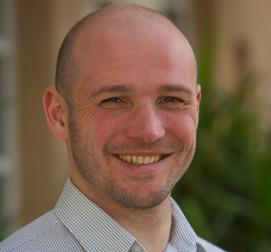SMPTE Q&A—Richard Welsh
Shortly before the start of the SMPTE 2016 Annual Technical Conference & Exhibition, NewBay editors spoke with Richard Welsh about his plans as the incoming Education Vice President for SMPTE.
TV TECHNOLOGY: What is your first order of business as the new Education Vice President for SMPTE?

RICHARD WELSH: SMPTE has a solid education program that is a key element of the organization's leadership in the industry. My first job is to make sure all the support and expertise remains in place to maintain the high standards SMPTE's education team is known for. That said, I want to hit the ground running and bring a group of diverse and strong individuals together to make sure we stay ahead of the pack with our work in education.
TVT:Are there topics/areas of knowledge you think SMPTE should focus on expanding right away?
RW: I believe the media industry is about to move into a new phase of connectivity—not just in terms of the way content reaches consumers, but in the way the systems, processes and content itself is all interconnected with the wider world. We have huge opportunities in the areas of multidimensional experiences, hyper-scale data, artificial intelligence applications. These are affecting almost all industries now and SMPTE is at an ideal juncture in its hundredth year to look forward, not months, but many years and even decades. Our education program is as much about inspiring the next generation of creative engineers to build the technologies and artistic tools of the future as it is learning about what is happening right now.
TVT: Are there educational methods—online resources, webinars, etc.—that you intend to utilize to a greater degree than SMPTE has previously?
RW: I think we make good use of many technologies including online already, but there is always room for improvement. I am keen to look at how we enrich the experience of SMPTE's education resources. For instance, the webinars are currently limited to a fairly two-dimensional experience—a webcast where the presenters and audience are all individually accessing the session through their computer. I'd love to see the webinar sessions take place with a live audience (maybe as part of a section meeting) and be webcast live. How about that in VR? I'm sure this would be a very engaging way to experience what has, in the past, been simply slides and an audio feed over the web.
TVT: The term “engineer” encompasses many more types of work than it did even quite recently, with much more happening in software and IT-based environments. How do you see SMPTE further expanding its educational arm to address this changing tech environment/workplace?
RW: We probably need to recognize what that role translates to in those fields. Software engineers are giving way to dev-ops in the IT world and anyone serious about moving "all-in" to an IP/software-based media environment will need to understand the new paradigm of the flexible engineer/operator that is becoming pervasive in IT. SMPTE is uniquely placed to identify the key attributes needed and define the next generation of media savvy coding ninjas. The hacker-filmmaker will rule the (media) world in the future.
TVT: How do you plan to extend education beyond the physical classroom/conference room? How do you reach the next generation of engineers and engage them?
RW: I think we need to embrace new thinking about the consumption habits of the up-and-coming SMPTE membership. We're great at long-form learning, but I think building a library of highly focused short-form learning would help us engage better. This could extend to many media formats and be highly searchable and extensible. I'd love SMPTE members to be able to tap a huge volume of learning resources that would adapt the content and build a custom experience for each individual. This probably looks like a huge task on face value, but the SMPTE members of the future are born of a generation that have come to expect a highly tailored experience from their entertainment content—why not their SMPTE experience too?
Richard Welsh is co-founder and CEO of Sundog Media Toolkit Ltd. Welsh has worked in the cinema industry since 1999. He has been involved in various technology development work during this time, primarily in digital cinema and is named on patents in the area of visual perception of 3D. He started the cloud software company Sundog in 2013, which specializes in scalable post-production software tools aimed at high-end broadcast and movie productions.
Get the TV Tech Newsletter
The professional video industry's #1 source for news, trends and product and tech information. Sign up below.
